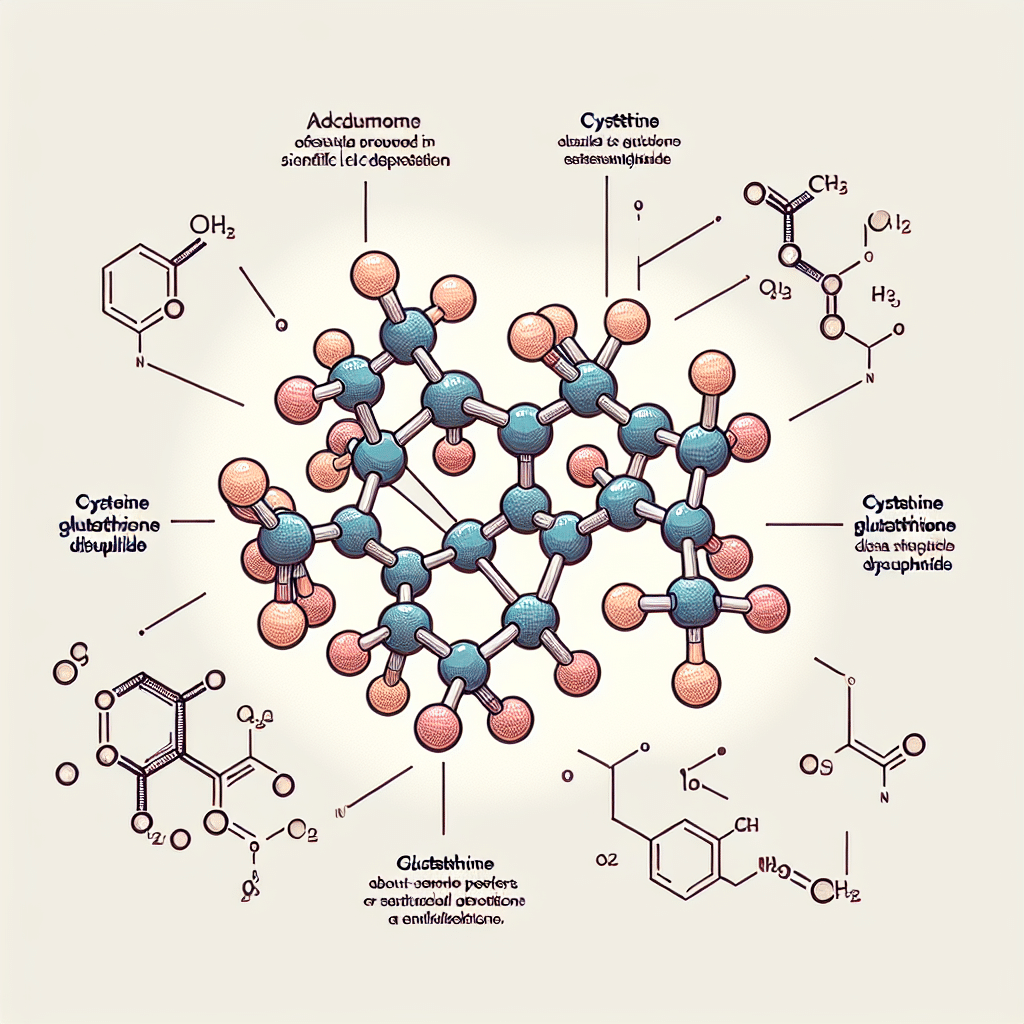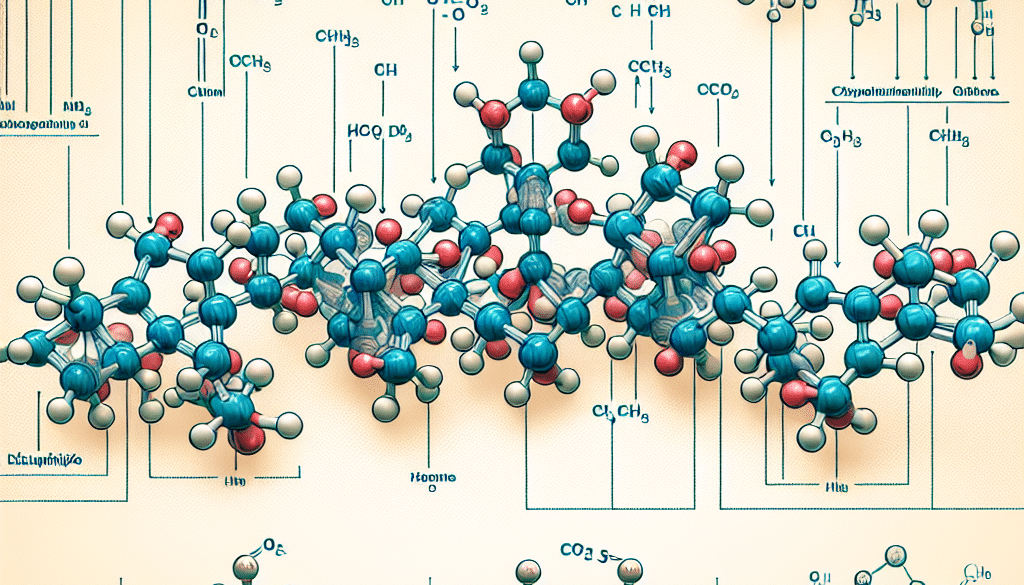Cysteine-Glutathione Disulphide: What to Know
-
Table of Contents
- Cysteine-Glutathione Disulphide: Essential Knowledge for Health and Wellness
- Understanding Cysteine-Glutathione Disulphide
- The Role of Glutathione in the Body
- Conversion Between GSH and GSSG
- Health Implications of Cysteine-Glutathione Disulphide
- Chronic Diseases and Oxidative Stress
- Ageing and Antioxidant Capacity
- Detoxification and Liver Health
- Immune System Support
- Boosting Glutathione Levels
- Dietary Sources
- Supplementation
- Lifestyle Factors
- Research and Case Studies
- Conclusion: The Significance of Cysteine-Glutathione Disulphide
- Enhance Your Health with ETprotein’s Protein Products
Cysteine-Glutathione Disulphide: Essential Knowledge for Health and Wellness

Understanding the role of amino acids and antioxidants in the body is crucial for maintaining optimal health. Cysteine-glutathione disulphide, also known as glutathione disulfide or GSSG, is a compound that plays a significant role in the body’s antioxidant defense system. This article delves into the science behind cysteine-glutathione disulphide, its importance in human health, and how it interacts with other biological molecules.
Understanding Cysteine-Glutathione Disulphide
Glutathione is a tripeptide composed of three amino acids: cysteine, glutamate, and glycine. It exists in two forms within the body: the reduced form (GSH) and the oxidized form (GSSG). The reduced form is the active molecule that participates in various biochemical reactions, while the oxidized form is essentially two glutathione molecules linked together by a disulphide bond between their cysteine residues.
The Role of Glutathione in the Body
- Antioxidant Defense: Glutathione is a powerful antioxidant that protects cells from damage caused by reactive oxygen species (ROS) and free radicals.
- Detoxification: It helps detoxify harmful substances, including environmental toxins and carcinogens.
- Immune Function: Glutathione supports the immune system by influencing lymphocyte function and cytokine production.
- Cellular Metabolism: It plays a role in DNA synthesis and repair, protein synthesis, and enzyme activation.
- Regeneration of Vitamins: Glutathione helps regenerate other antioxidants, such as vitamins C and E, back to their active forms.
Conversion Between GSH and GSSG
The ratio of reduced glutathione (GSH) to oxidized glutathione (GSSG) within cells is a critical indicator of cellular oxidative stress. Under normal conditions, the majority of glutathione is in the reduced form. However, during oxidative stress, GSH is converted to GSSG, and the balance shifts. The enzyme glutathione reductase plays a vital role in converting GSSG back to GSH, thus maintaining the redox state of the cell.
Health Implications of Cysteine-Glutathione Disulphide
The balance between GSH and GSSG is essential for health and is implicated in various diseases and conditions.
Chronic Diseases and Oxidative Stress
Oxidative stress is a common factor in many chronic diseases, such as cancer, cardiovascular diseases, diabetes, and neurodegenerative disorders like Alzheimer’s and Parkinson’s disease. An increased GSSG to GSH ratio is often observed in these conditions, indicating a higher oxidative burden.
Ageing and Antioxidant Capacity
As we age, the body’s ability to produce and recycle glutathione diminishes, leading to a decrease in antioxidant capacity. This can contribute to the ageing process and the development of age-related diseases.
Detoxification and Liver Health
The liver is the primary organ responsible for detoxification, and glutathione plays a central role in this process. Adequate levels of GSH are necessary to neutralize toxins and support liver function.
Immune System Support
Glutathione influences the immune system by promoting the proliferation of lymphocytes and the production of cytokines, which are essential for an effective immune response.
Boosting Glutathione Levels
There are several ways to support and increase glutathione levels in the body:
Dietary Sources
- Consuming foods rich in sulfur-containing amino acids, such as cysteine and methionine, can help boost glutathione production. These include meats, eggs, dairy products, nuts, and legumes.
- Foods high in selenium, such as Brazil nuts, fish, and sunflower seeds, also support glutathione synthesis.
Supplementation
Supplements like N-acetylcysteine (NAC), alpha-lipoic acid, and silymarin have been shown to increase glutathione levels and enhance its antioxidant effects.
Lifestyle Factors
- Regular exercise can increase the body’s production of glutathione.
- Avoiding excessive alcohol consumption and exposure to environmental toxins can help maintain glutathione levels.
Research and Case Studies
Several studies have highlighted the importance of glutathione in health and disease. For instance, research has shown that patients with chronic illnesses often have lower levels of GSH and higher levels of GSSG. Supplementing with cysteine donors like NAC has been beneficial in conditions such as chronic obstructive pulmonary disease (COPD) and HIV, where it helps to replenish glutathione stores.
In a case study involving patients with Parkinson’s disease, glutathione supplementation was found to improve symptoms and slow disease progression. This suggests that targeting oxidative stress through glutathione modulation could be a therapeutic strategy for neurodegenerative diseases.
Conclusion: The Significance of Cysteine-Glutathione Disulphide
In conclusion, cysteine-glutathione disulphide is a vital component of the body’s antioxidant defense system. Maintaining a proper balance between GSH and GSSG is essential for protecting against oxidative stress, supporting detoxification, and promoting overall health. Through diet, supplementation, and lifestyle choices, individuals can influence their glutathione levels and potentially reduce the risk of chronic diseases and the effects of ageing.
Enhance Your Health with ETprotein’s Protein Products
If you’re looking to support your health with high-quality protein products, ETprotein offers a range of options that can help boost your glutathione levels. Their organic bulk vegan proteins are an excellent source of cysteine and other amino acids necessary for glutathione synthesis. With a commitment to non-GMO, allergen-free ingredients, ETprotein ensures that you’re getting the best for your health.
About ETprotein:
ETprotein, a reputable protein and L-(+)-Ergothioneine (EGT) Chinese factory manufacturer and supplier, is renowned for producing, stocking, exporting, and delivering the highest quality organic bulk vegan proteins and L-(+)-Ergothioneine. They include Organic rice protein, clear rice protein, pea protein, clear pea protein, watermelon seed protein, pumpkin seed protein, sunflower seed protein, mung bean protein, peanut protein, and L-(+)-Ergothioneine EGT Pharmaceutical grade, L-(+)-Ergothioneine EGT food grade, L-(+)-Ergothioneine EGT cosmetic grade, L-(+)-Ergothioneine EGT reference grade and L-(+)-Ergothioneine EGT standard. Their offerings, characterized by a neutral taste, non-GMO, allergen-free attributes, with L-(+)-Ergothioneine purity over 98%, 99%, cater to a diverse range of industries. They serve nutraceutical, pharmaceutical, cosmeceutical, veterinary, as well as food and beverage finished product distributors, traders, and manufacturers across Europe, USA, Canada, Australia, Thailand, Japan, Korea, Brazil, and Chile, among others.
ETprotein specialization includes exporting and delivering tailor-made protein powder and finished nutritional supplements. Their extensive product range covers sectors like Food and Beverage, Sports Nutrition, Weight Management, Dietary Supplements, Health and Wellness Products, and Infant Formula, ensuring comprehensive solutions to meet all your protein needs.
As a trusted company by leading global food and beverage brands and Fortune 500 companies, ETprotein reinforces China’s reputation in the global arena. For more information or to sample their products, please contact them and email sales(at)ETprotein.com today.












